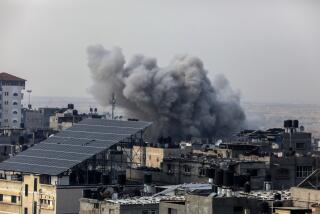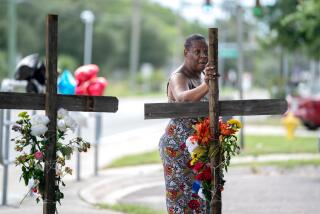To Rescue Islam From Jihad, Muslims Must Look Within
STANFORD â August was a bloody month. There was barely time to mourn between the exploding bombs: first at the Marriott hotel in Jakarta on Aug. 5, at U.N. headquarters in Baghdad and on a bus in Jerusalem on Aug. 19, then the two in Bombay on Monday. These were the latest sites in a chronology of carnage running from Casablanca through Riyadh and Bali to Manhattanâs crumbling towers.
Each atrocity involved local actors and local motives. Each was perceived differently by the local populace, and the local repercussions of each terrorist act varied widely. Yet all were attributed to a single global menace: jihad. For three years now, acts of violence done in Allahâs name have made terrorism and Islam almost synonymous, not just in Westernersâ vocabularies but around the world.
From this blight, who will rescue Islam?
The nearly reflexive association of Islam and terrorism is not simply the creation of rush- to-judgment pundits and politicians. Not when the terrorists proudly proclaim religious inspiration for their acts. Both Jerry Falwell and Osama bin Laden have maligned Islam. But it is, above all, the jihadists who have distilled their faith to sacred hatred -- of Americans, Christians, Jews and the millions upon millions of moderate or secular Muslims who disdain this perversion from within.
Muslims respond in different ways to Islamist violence. In Jakarta a few days after 11 Indonesians and a Dutchman were killed in the blast at the Marriott, I met up with two Muslim friends. They were brimming with conspiracy theories. Why, they asked, had 20 Americans reportedly canceled their reservations before the bomb went off? Could these no-shows have known in advance of the attack? Why was the severed head of the alleged perpetrator later found on the hotelâs fifth floor? Had the CIA planted it there? Why were arrests made so soon? Could the U.S., or perhaps the Indonesian military, have staged the event?
Behind their questions lay an unspoken one: How could Muslims have done such a thing?
It would be convenient if my two friends despised Americans and were products of Islamist schools. But both men hold advanced degrees from top universities in the U.S. and exhibit no obvious animosity toward Americans. That two such people could give voice to such dark misgivings about U.S. intentions shows that Islam is not alone in its association with violence.
The flip side of denial is demonization. For some in the West, the enemy is not jihadists but all Islamists. Never mind that the vast majority of Muslims who promote their faith do so peacefully. The PowerPoint charts of counter-terrorism experts that ignore Muslim diversity and feature the evil genius Bin Laden reinforce a distorted, top-down view of Islam.
Al Qaedaâs responsibility is all too real. But local context matters. For jihad to succeed, an outside agitator needs inside sympathizers, and their receptivity to recruitment will depend on local circumstances. Recognizing that Muslim societies are autonomous and heterogeneous is a necessary first step to realizing that Bin Laden and his version of Islam arenât absolute control.
Defenders of Islam in the West stress the fact that most of its billion-plus adherents are moderates who reject violence. Such reassurance is far preferable to demonization. But understanding is not served by exaggerations -- that Islam or Muslims are always peaceful, or that jihadists entirely lack sympathy in the Muslim world. In Muslim communities, extremist and mainstream views intersect in many places, including schools, mosques and organizations. It is in these myriad local settings that Islamâs connection to violence will or wonât be broken.
Regrettably, reassurance sometimes lapses into denial. In Indonesia recently, several leading Muslim figures urged journalists to stop using the words âIslamâ and âMuslimâ in their coverage of the Marriott bombing. Iâve even heard Muslims object to the phrase âmoderate Muslimsâ because it implies the existence of immoderate ones. Islam will never be rescued by language inspectors who would substitute deflection for introspection.
Can reform rescue Islam? In principle, yes, but in practice, not necessarily. There are at least a few individuals and groups in every Muslim society striving to make the practice of their faith more tolerant of difference and dissent, less restrictive toward women, more compatible with secular democracy and less preoccupied with imposing Islamic law. Liberal American observers tend to celebrate these reformers as rescuers of Islam.
Yet the sheer diversity of Muslim societies suggests that efforts to liberalize Islamic doctrine will face varying prospects of success. Before assuming that liberals and jihadists have nothing in common, one should remember that both advocate far-reaching changes that threaten the conservative views and habits of many mainstream Muslims. Reformers deserve American support. But preventing the status quo from getting worse may be a more realistic goal of such help than winning âhearts and mindsâ for humanism, let alone making the Muslim world look as secular and democratic as, say, Turkey.
Is America responsible for Islamâs predicament? Some U.S. actions have fueled jihad. The American presence in Iraq could become a magnet for holy warriors comparable to the Soviet occupation of Afghanistan. Muslims pressed by Washington to oppose the hijacking of Islam by jihadists may instead decry the hijacking of U.S. foreign policy by hard- liners around President Bush.
But jihadists were fighting enemies long before the United States was born. The drive to create Islamist states is more than an attempt to check American hegemony. Different U.S. policies might shrink Muslim hostility toward U.S. actions. But intransigent theocrats will not be assuaged by the compromises necessary to resolve the Israeli- Palestinian conflict. Nor will either the failure or success of U.S.-led reconstruction of Iraq remove the reasons for Islamist violence in other Muslim societies.
Also shaky is the notion that âthey hate us for our values.â The democracy Americans espouse remains popular in the Muslim world. American notions of equal treatment for women are less welcome. But a womanâs opportunities vary among Muslim-majority countries, including those in Asia that preceded the U.S. in having female heads of state.
Americans are disproportionally responsible for a modern world most Muslims feel they never made. Extremists have used such alienation to justify jihad. But it is not up to Americans to rescue Islam.
Non-Muslims can avoid unnecessary provocations and false reassurances. They can facilitate liberal reform. But it is Muslims, acting in diverse local circumstances, who will or wonât break the cycle of jihadist demonization and naive denial that is ruining the image of their religion. Whether to rescue their faith is a choice only they can make.
More to Read
Sign up for Essential California
The most important California stories and recommendations in your inbox every morning.
You may occasionally receive promotional content from the Los Angeles Times.










